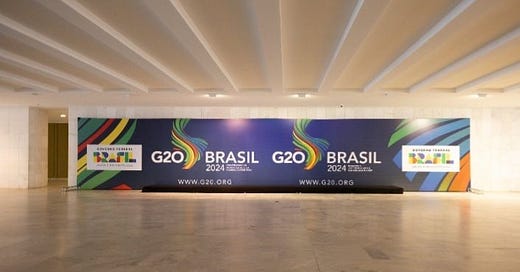PREAMBLE
A new study explores how G20-BRICS synergy could reshape global economics. With combined influence over 80% of world GDP, can these powerhouses drive inclusive development?
Related Readings in csloh.substack site:
The Johannesburg BRICS Declaration
American ways of confronting BRICS
Global South Strengthening Cooperation with BRICS
BRICS urged to play active role in Somalia-Somaliland dispute
As Brazil assumes the G20 presidency in 2024, a research paper published in June 2014 by Aleksandra Jaskólska and Monish Tourangbam explores the potential for collaboration between the G20 and BRICS to address challenges facing the Global South. This analysis comes at a critical juncture in international relations, with the world grappling with post-pandemic recovery, ongoing conflicts, and shifting global power dynamics.
Brazil's G20 presidency, themed "Building a just world and a sustainable planet," coincides with recent developments in the BRICS group. The expansion of BRICS to include Egypt, Ethiopia, Iran, Saudi Arabia, and the United Arab Emirates has significantly increased its global economic footprint.
The numbers paint a compelling picture. The G20 represents over 80% of the world's GDP and 60% of the global population. The expanded BRICS now accounts for more than 35% of the world's GDP and about 40% of the world's population. This combined influence creates a potent force for potential change in global governance.
One key area of potential cooperation is the diversification of global currencies in international trade. The study notes that in 2022, the US dollar accounted for almost 90% of all foreign exchange transactions. However, there's a growing interest among BRICS countries in reducing this reliance. For instance, as of December 2022, nearly half of China's external debts were dollar-denominated, while in India, this figure stood at over 50% as of mid-2022.
The paper emphasizes the need for "inclusive multilateralism" – a more equitable global governance model. It highlights that BRICS and G20 countries already participate in various international organizations, providing a foundation for enhanced cooperation. For example, all BRICS members are part of the United Nations, with China and Russia holding permanent seats on the Security Council.
A significant focus of the potential G20-BRICS collaboration is the advancement of Sustainable Development Goals (SDGs). The researchers suggest that reformed Multilateral Development Banks (MDBs) could play a crucial role in achieving these goals. The G20 New Delhi Leaders' Declaration emphasized that "stronger MDBs will be important to our efforts to mobilize financing from all sources for a quantum jump from billions to trillions of dollars for development."
However, challenges remain. Many developing countries face significant debt burdens. In some parts of the Global South, more funds are being used for interest payments than on health and education combined, hampering progress towards SDGs.
A reposting from




